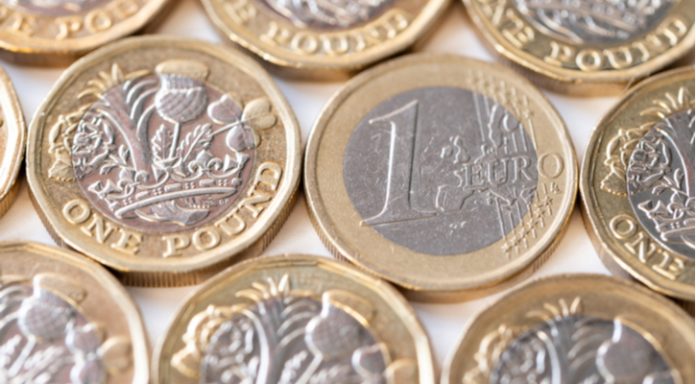- Pound (GBP) falls as inflationary pressure ease
- Food inflation cools to its lowest level since December 2021
- Euro (EUR) rises as GBP expands at 0.4% QoQ
- Eurozone inflation was stickier than expected at 2.7%
The Pound Euro (GBP/EUR) exchange rate is falling, snapping a 5-day winning streak. The pair rose 0.39% in the previous session, settling on Monday at €1.1722 and trading in a range between €1.1681 and €1.1723. At 10:00 UTC, GBP/EUR trades -0.24% at €1.1693.
The euro is pushing higher across the board after stronger-than-expected GDP data and hotter-than-expected inflation.
Eurozone GDP rose 0.4% in the first quarter, up from a 0% reading in the final quarter of 2024, supporting the view that the eurozone’s recovery out of recession is speeding up. The region recorded its strongest pace of growth in 1 1/2 years as the prospects for the block brightened.
This is the latest in a series of recent data which has highlighted a recovery in the eurozone economy and comes after EC president Christine Lagarde said earlier in the month that signs of recovery were clear.
However, inflation was also stickier than expected, cooling to 2.7% year on year in March, down from 2. 9% in February. This was slightly above the 2.6% level forecast.
Still, the ECB is likely to cut rates in June, although what happens after that remains unclear.
Following the data, money markets paired rate cut bets slightly for this year, fully pricing in two quarter-point reductions and 76% of a third rate cut. This has helped to give the euro a boost.
The pound is falling after data showed that UK shop prices rose by the least since December 2021. According to the British Retail Consortium, prices in UK shops rose at the slowest pace, 0.8%, down from 1.3% in March.
Meanwhile, non-food goods fell by 0.6% in annual terms after a 0.2% rise in March. This marked the first negative reading since October 2021.
The data adds to signs that inflationary pressures in the UK are easing. Anne supports the view that the Bank of England could start cutting interest rates as soon as August or September.





